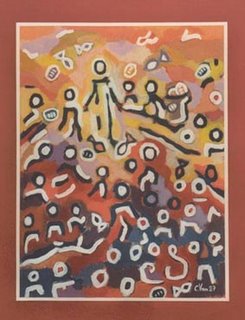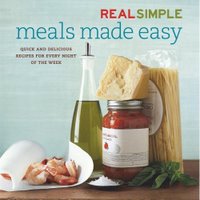 I read a little while ago an inspired bit of reflection from Katherine over at Any Day a Beautiful Change in which she considered how far she is from fitting the typical pastoral profile. As she often does, Katherine struck a chord in me. When I realized that any comment I would write in response to her latest post would end up being rather lengthy, I thought I'd take the space here instead. My reflections are not in any way an "answer" to Katherine's reflections. They are merely my own thoughts sparked by her words. Before reading this post, I highly recommend you read hers.
I read a little while ago an inspired bit of reflection from Katherine over at Any Day a Beautiful Change in which she considered how far she is from fitting the typical pastoral profile. As she often does, Katherine struck a chord in me. When I realized that any comment I would write in response to her latest post would end up being rather lengthy, I thought I'd take the space here instead. My reflections are not in any way an "answer" to Katherine's reflections. They are merely my own thoughts sparked by her words. Before reading this post, I highly recommend you read hers.The notion of fitting a professional profile or filling a role has interested me for some time. Maybe any woman who has at least gotten as far as considering a position as a pastor of a church has to face these issues head on at some point. Yesterday, after preaching at my church (something I do maybe three times a year as a lay person with a church staff position), I got into a conversation with a woman who is about 65 years old or so. She told me that a granddaughter had been born in their family lately, the first girl in seven years or so. I smiled and mentioned that I was the first girl born on my father's side of the family in 96 years! Her immediate response: "And now you're doing a job that men usually do!" She's right in a way.
One of the reasons it's been so scandalous for women to become preachers is that it's essentially perceived to be a gender-bending activity. In the nineteenth century, this was very much the perception. A woman who wanted to preach was often perceived to be mentally ill--the equivalent to many folks' unfortunate reaction to cross-dressers today. This view, tragically, is not locked into the nineteenth century. I remember encountering a website this past year where someone argued directly from this perspective, equating women preachers to transvestites.
I think my dear friend SRF would suggest that women preachers queer the pastoral role in a way that breaks the role open to God's kin-dom here and now. It disrupts the usual expectations in a way that lets grace seep through the cracks.
But 'taking on a role' is not only about being a pastor. bell hooks reflects on this subject briefly in her book Teaching to Transgress. She remarks:
I feel the way I teach has been fundamentally structured by the fact that I never wanted to be an academic, so that I never had a fantasy of myself as a professor already worked out in my imagination before I entered the classroom. I think that's been meaningful, because it's freed me up to feel that the professor is something I become as opposed to a kind of identity that's already structured and that I carry with me into the classroom.
Like being a pastor, being a professor certainly has a sense of filling a preconceived role rather than something we become, gradually, in our own way, over time. The feeling is akin to the sense that one has 'big shoes to fill.' The roles come complete with costumes--whether it's a stole, a robe, or an alb. Or a Volvo stationwagon, flowing linen dresses, and cropped hair. The roles come complete with certain languages one is supposed to be fluent in (not just Hebrew but pastor-speak or professor-speak), or a demeanor one is supposed to assume.
While we bring our own assumptions to these roles, we are also shaped by the way others expect us to be, too. So my students have a certain idea of what it means for me to be a professor--and I am shaped by those expectations. Even if I am not those things, even if I don't meet their expectations they still shape me.
In seminary one of my colleagues refused to do the usual Clinical Pastoral Education (CPE) units during the summer months between her first and second year in school. Instead she took her whole middler year to do CPE, with the hours spread over the course of two semesters rather than over three months. She told me why she chose to do it that way: "The CPE model is still really heavily influenced by the young, single male seminarian--someone who doesn't have a family to care for, or a home to help shape in any significant way. I refuse to work myself to the bone over the summer--and not have any time or energy for my partner. I need the summer to be more restful so my relationships can be sustained in a healthy way."
My friend was perceptive enough to see what had long-shaped the role that she would be assuming. And she knew that it would not be healthful for her to step into such a pre-formed, rigid model. She needed to do something new, something that made sense for her life.
But others' expectations of how you fill a role are not necessarily a bad thing. While I was in seminary, I read Hillary Rodham Clinton's book Living History. She reflects honestly about her struggles with being First Lady--never seeming to meet people's expectations of her. Her role was so public, that any "mistake" she made brought wave after wave of criticism and negative press. At some point, though, she met with someone who helped her to understand what she was experiencing in a new way. (I'll be darned if I can find the quote in the book, so I'm just re-creating this from memory.) Her friend explained to her that the position of First Lady is a symbolic one. (Now is a good time to remember that it's never useful to say, "It's just a symbol" as if a symbol doesn't carry huge import and life-changing consequences.) Clinton realized that the symbolic role of First Lady carried a vast amount of possibility with it--that one couldn't re-create the role without experiencing huge repercussions. When she realized she could live into the role with the full knowledge that it is a symbol, then she learned how to navigate her world effectively and powerfully.
The role of a pastor and a professor are similarly symbolic roles. They carry a weight and an import that have nothing to do with us. This is not to say we cannot be ourselves when we're in these roles. But it is to say we will never be only ourselves.
It is a delicate and a difficult balance. There are expectations assigned to these roles which are not life-giving, to the one living them out as well as to those who are in relationship with that role. There are expectations which simply have to change--and the sooner the better. We have to make ourselves aware of how these roles are shaped by patriarchy, hierarchy and even consumerism. But there are expectations which will also empower, need to be lived into (not like too-large shoes, but like a sunflower grows toward the light). Who we are will bend to these things and change us in ways we don't expect. And we'll stay the same, too, in ways we don't expect.
Now I have to get back to studying for my exam. So I can become a professor someday...


